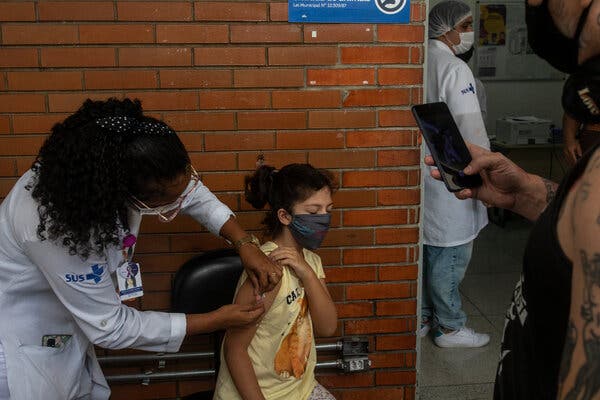When Prime Minister Benjamin Netanyahu of Israel rolled up his sleeve in December 2020 to receive a dose of the Pfizer-BioNTech coronavirus vaccine, kicking off one of the world’s first mass rollouts of Covid shots, he declared that it marked “the beginning of the end” of the pandemic.
Thirteen months later, his prediction has proved far from true, but 10 billion vaccine doses have been administered globally, a milestone that reflects the astonishing speed with which governments and drug companies have mobilized, allowing many nations to envision a near future in which their people coexist with the virus but aren’t confined by it.
The milestone, reached on Friday, according to the Our World in Data project at the University of Oxford, has not been arrived at equitably, even though 10 billion doses could theoretically have meant at least one shot for all of the world’s 7.9 billion people.
In the wealthiest countries, 77 percent of people have received at least one dose, whereas in low-income countries the figure is less than 10 percent. As North America and Europe race to overcome Omicron surges by offering boosters, with some nations even contemplating a fourth shot, more than one-third of the world’s people, many of them in Africa and poor pockets of Asia, are still waiting for a first dose.
The United States has administered five times as many extra shots — about 85 million — than the total number of doses administered in all of Nigeria, Africa’s most populous nation.
“Ten billion doses is a triumph of science but a complete failure of global solidarity,” said Madhukar Pai, a professor of epidemiology and biostatistics at McGill University in Montreal.
And not all vaccines are the same. Those made in China have shown to be less effective than the mRNA vaccines from Pfizer-BioNTech and Moderna. And while nearly all of the world’s Covid vaccines protect against severe illness, early research suggests that most offer little protection against infection from Omicron.
The consequences of the vaccine gap have been highlighted by Omicron, which was first identified in southern Africa. Low vaccination coverage creates conditions for widespread virus circulation and with that the possibility of new variants emerging.
The disparities remain even as Covax, the global vaccine sharing initiative that facilitates distribution of donations from rich nations, increases its deliveries. After a slow start because of hoarding by rich nations and large outbreaks that prompted export blockages, Covax said this month that it had delivered its billionth dose — though that is less than half of its initial target.
Misinformation on social media and mistrust of government and pharmaceutical companies has fed into vaccine hesitancy in many countries. Even where people are willing to be inoculated, delivering doses to far-flung areas with poor health infrastructure has been challenging.
Thomas Hale, an associate professor of public policy at the University of Oxford, said that in sub-Saharan Africa, “We’re seeing pretty good vaccination rates in cities and capitals, where vaccines tend to land, but that supply runs headfirst into the general challenges of building stronger health systems in these countries.”
High-income nations have announced initiatives to assist, including the Global Covid Corps, a U.S. government program to help countries overcome logistical and delivery hurdles. But experts say that another monumental challenge is that rich countries have failed to agree on waiving intellectual property restrictions on vaccines, and have not put pressure on drug companies to share their technology so that poorer nations can manufacture doses locally.
South Africa, for example, has set up a hub to begin developing mRNA vaccines where scientists, with the backing of the W.H.O., are trying to reverse-engineer the Moderna vaccine from scratch, because the U.S. drugmaker won’t share its technology.
Dr. Pai likened this to reinventing the wheel while a car is on fire.
“We have learned through this pandemic that charity does not work in global health, and charity is not the same as justice,” he said. “And that is what countries are looking for — a just approach to be able to save themselves.”


























